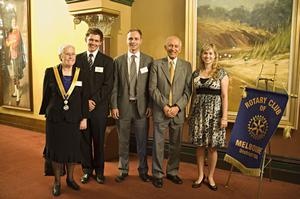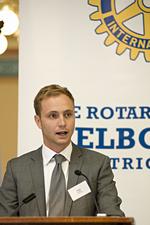|
Young Achiever Awards - 2008/2009
Each year, the Rotary Club of Melbourne recognises and honours outstanding young achievers with an award and a cheque for $1,000. Candidates need to show outstanding success in their formal education and have made a significant contribution in the form of service to the community.
There were three awards this year presented by Professor David de Kretser, Governor of Victoria, to Peter Clark, Hugo Batten and Amanda McKenzie.
Professor David deKretser, Governor of Victoria
Thank you for the opportunity of joining you to day to celebrate the winners of the 2009 Young Achiever Awards. In my role as the Governor, I am exposed to a diverse range of community groups and organisations where I often have the opportunity to meet young Australians. I am continually impressed by their stories which demonstrate their selfless and socially responsible attitudes. The Young Achievers whom you have honoured to day have achieved so much professionally and have set a wonderful example of service to communities both local and international. You have all enriched our society through your endeavours and provide fine leadership to your peers. Victoria needs young leaders and achievers now, more than ever before.
The first two months of 2009 have left Victorians in a state of shock. January was coloured by the worsening global financial crisis and February will always be remembered by Victorians for the worst natural disaster in our country’s history. Yet, it is in times of hardship that we are often reminded of the best in humanity. If there was any fear that Victorians were losing their sense of community, the bushfire tragedy has all but dispelled this concern. Yes, there have been reports of arson, looting and charity theft, but the vast majority of Victorians have demonstrated that, despite the economic climate, their thoughts are translated into actions to help those who are struggling. I was heartened to hear and read reports of Australians donating money, clothes, blood and time to help those in need. Certainly, our visits to the relief centres at Yea and Whittlesea, gave us a first had view of the masses of donated goods. It also gave us a direct impression of the disasters that had befallen those in the fire ravaged communities.
For instance, the effort of the volunteers in Yea was inspiring. A temporary business centre had been established, where people could seek help through Centrelink or the Department of Human Services. Next door in the kitchen, Red Cross were maintaining order with a small but strong contingent of workers, who were ensuring a constant supply of food was being offered to those seated on tables in the hall or outside on the oval. At the end of that same hall were trestles of clothes, toiletries, games and toys, which had been, and were continuing to be, sorted by the manager of an opportunity shop and her efficiently run team. Outside on the oval, to the left of the tent city, were children playing. This was a community. It was a community that had been rebuilt with the help of groups and organisations but also by the young.
There were young people at Yea who had volunteered their time to comfort families, to listen to those who wanted to talk, to act as babysitters. They had no specific role with an organisation or qualifications but were compelled as human beings to support and care for others. When news of the Victorian bushfires reached some of these young people in New South Wales, they immediately got in their car, with nothing more than a fresh t-shirt. One even left her young baby with her mother and drove to Yea. As they journeyed down, when they stopped for a refreshment, those along the way provided goods and even, the waitresses donated their tips. When they arrived, they attempted to support families and bring normality back to the lives of the children who were affected.
There is a lovely synergy in these young people trying to establish a sense of normality for those who will have to live with the memories of this tragedy for the rest of their young and adult lives. Whilst the adults of these areas will rebuild the foundations of these towns, it is the children and young people, as part of families, that will help to make them communities once more.
As we age, opinions and beliefs, whether well informed or misguided, tend to become more concrete. Young people are less bound by the social constraints of race or religion and have the ability to break down these barriers. They have a level of basic understanding of what’s right and what’s wrong, as taught to them by their parents and teachers, yet they do not often appear to choose playmates because of the clothes they wear or the God they worship. Friendships are founded on trust and feelings. Where someone lives, what car their parents drive or whether English is a second language in the family home is of little concern to a child. As adults, we can certainly learn a lot from our children and from the youth in our society. We should endeavour to propagate the feelings of equality and cohesiveness that has been felt during the recent Victorian bushfire tragedy because they are the basic fundamentals of a community.
Through my encounters with young adults and the Young Achievers here today, my faith in the younger generation is reaffirmed. The people whom we interview for the Rhodes scholarships, the Duke of Edinburgh awardees, the young people who give up their Saturdays to mentor Sudanese families as part of the Sail program and the young men who have started the “Stepback and think” initiative to curb injuries from violence between young people are all making fantastic contributions to our community. While our media highlights some of the negative aspects of what young people do, we rarely see the many positive things that young people undertake reported in the press. I do hope that the stories of these young achievers that you have honoured here today will be communicated to the wider community in the media. It is critical that communication between the younger and older generations is facilitated even though the usual modes of communication may differ between those groups in our community. Those of us who are older need to ensure that the enthusiasm and the unbiased approaches of younger generations is not suppressed or dismissed without a fair hearing or trial. I encourage you all to continue supporting our children and young adults and also to continue learning from them.
Finally, I would like to again congratulate to the 2009 Young Achiever Award winners. You made an outstanding contribution which should make you and your families very proud. I hope that you continue to inspire other young people to follow in your foot steps. I look forward to hearing more about your accomplishments.
Thank you.
Responses By Young Achievers Award Recipients
Amanda McKenzie
Amanda completed a Law degree with honours at Monash University in 2007 after completing an Arts degree from Melbourne University in 2004. Her honours thesis, which was granted a High Distinction, addressed the issue of 'Designing an Emissions Trading Scheme that is Compatible with the Global Carbon Market'. She is interested in studying for her Masters or PhD overseas.
Amanda has spent significant time engaging in community work. She has volunteered at the Asylum Seeker Resources Centre, the Red Cross and the Environmental Defenders Office, and edited the Australian Journal of Peace Studies. Amanda is now working as Co-Director of the Australian Youth Climate Coalition, a partnership of youth organisations across Australia. Over the last two years Amanda has worked to create this peak youth body on climate which is now a credible and powerful national organisation, as demonstrated by its recent profiling on Lateline and other national media.
In 2008 Amanda led a delegation of 20 young Australians to the UN Climate Conference in Poland. She has represented Australian youth in discussions with Federal and State Ministers, Professor Ross Garnaut and business leaders. Amanda is now working to create an International Youth Climate Network as well as continuing her work with the Australian Youth Climate Coalition. Two key activities this year include organising Australia's national youth climate summit for 3000 young people in July 2009 and overseeing AYCC's national Switched On Schools program for high school students around Australia.
Peter Clarke
Peter is a violinist and played his first concerto with the Youth Orchestra at the Tasmanian Conservatorium of Music at 9 years old. At 12 he entered the School of Performing Arts on a scholarship with the Hutchins school in Hobart. Before moving to Melbourne in 2007 to study music at the University of Melbourne he was the concertmaster of the Tasmanian Youth Orchestra. He was awarded the inaugural Markwell Scholarship and is a resident of Trinity College while completing his studies.
He was selected as an Emerging Artist with the Australian Chamber Orchestra and very recently has been asked to go on tour with the Australian Chamber Orchestra to the US. In April he will be performing in venues such as Carnegie Hall!
He is currently principal second violin with the Australian Youth Orchestra as well as a member of the respected Trinity College Choir.
In 2008, he received a high distinction (H1 grade) average in both semesters at University.
Peter’s community service is currently within the education program of ACO. He visits regional schools all across Australia to run workshops for young school children. This is typically in disadvantaged areas where music education is not readily available.
As well as this, he regularly visits a number of people with severe disabilities including his eldest brother to play music with them. He sees that this directly improves their quality of life. He also visits nursing homes on a regular basis and play small recitals for the residents. He sees that the power of music really becomes apparent with the delight shown on the faces of the elderly residents and my disabled friends.
Hugo Batten - Sir Albert Coates Award recipient
After completing his secondary studies at St Kevin’s College with a Tertiary Entrance Rank of 99.55. Hugo completed honours degrees in Arts and Law at the University of Melbourne. He was able to combine his community service interests and academic work winning the Daniel Sandor Prize at the Law School for his essay about the treatment of children and young adults in the US justice system based on work he had done in New Orleans on the defence of minors charged with death penalty offences.
His Honours Thesis (for which he was awarded first class honours) was concerned with Chinese aid to Sub-Saharan Africa and enabled him to do a high-level analysis of African education and development. He intends this thesis to form the basis of further study at Oxford or Cambridge where he would like to complete a Masters of International Relations and focus on the effectiveness of aid in the Sub-Saharan region.
Hugo’s community service contributions are focussed on overcoming disadvantage. In 2005 he tutored Vietnamese and Somalian students as part of the Jesuit Social Services Atherton Gardens program. In 2006, he enjoyed five months in Tanzania and then Cape Town tutoring children and remains in contact with people he met there.
In 2007 he was on an exchange program to Cape Town and tutored students and assisted senior ANC youth leaders with the development of policies and editing newsletters. Last year, he was a volunteer legal intern for the Native Title Services Board where he assisted in Aboriginal land claims. He was able to contribute to progression of one group's journey to at least getting access and determination over some of their traditional lands.
|